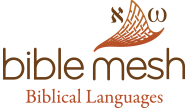

GRK320/GRK720: Analyzing the Narrative Discourse of Mark 1–8
In Analyzing the Narrative Discourse of Mark 1–8 you will learn about discourse features of biblical narrative as you read through the first half of the Gospel of Mark. Some concepts taught are the discourse-level function of Greek conjunctions, background and foreground analysis, principles of Greek word order, and analyzing structural boundaries.
At a Glance
- Assigned proctor to guide you through the course and provide extra assignments
- Access to all Level 4 text-based resources, audio recordings, videos, and assessment tools
- Access to the BibleMesh Cerego vocabulary learning system for all words from Mark 1–8 and all words that appear 24 times or more in the Greek New Testament
- $250 per month access to complete the course at your own pace
More Details
In Analyzing the Narrative Discourse of Mark 1–8 you will learn about discourse features of biblical narrative. Some concepts taught are the discourse-level function of Greek conjunctions, background and foreground analysis, principles of Greek word order, and analyzing structural boundaries.
This course is suitable for you if you have completed Greek Reading 1, 2 and 3 or if you have previously studied Greek at an advanced level and are looking to refresh your knowledge.
Example Timeframe: 8 hours per week in order to complete in 16 weeks
Course Overview
You will learn vocabulary words that appear 24–29 times in the Greek New Testament (about 100 words total), review the content of Greek Reading 1–3. The titles of articles within this course are as follows:
Unit 1: Conjunctions
- Morpology, Syntax, and Discourse Grammar
- Discourse Segmenting with Δε
- The Function of Γάρ: Signaling Explanatory Information
- And What? Understanding Και
- Understanding Ἀλλά: Signaling a Correction
Unit 2: Background and Foreground
- Introduction to Background and Foreground
- Default and Marked Constructions
- Aspect and Background/Foreground
- Background and Foreground in Subordinate Clauses
- Marked Verbal Forms and Background/Foreground
Unit 3: Historical Present
- Introduction to the Historical Present
- Background and Foreground Review
- Participants, Location, and the Historical Present
- Not X Except Y: The Function of Εἰ μή and Έὰν μή
- Mark 3:28–35: A Text in Review
Unit 4: Word Order and Points of Departure
- Introduction to Greek Word Order
- Referential Points of Departure
- Situational Points of Departure
- A Review of Constituent Order in Mark 4:32–34
- Mark 4:35–41: A Text in Review
Unit 5: Word Order and Focus Constructions
- Introduction to Focus Constructions
- Narrow Focus
- Clause Focus
- Focus Constructions in Mark 5:27–34
- Mark 5:35–43: A Text in Review
Unit 6: Advanced Word Order
- Making Sense of Multiple Preverbal Constituents
- Focus Constructions Review
- Postverbal Constituent Order
- Mark 6:53–56: A Text in Review
Unit 7: Review
- Reviewing Background and Foreground
- Reviewing Connectives
- Reviewing Focus Constructions
- Reviewing Points of Departure
- Mark 7:31–37: A Text in Review
Unit 8: Boundary Features
- Introduction to Boundary Features
- Deictic Centers and Boundary Levels
- Genitive Absolutes
- Mark 8:31–38: A Text in Review
About the Technology
Developed By
Dr. Mark Dubis
Mark Dubis is Professor of Biblical Studies at Union University in Jackson, Tennessee. He has a passion for ancient languages, having taught Greek, Hebrew, and Latin. He also has a special concern for the global needs of Bible translation. He is the author of 1 Peter: A Handbook on the Greek Text among other publications. Mark provides a high-level understanding of both linguistic and exegetical principles and, from his years in the classroom, he knows how to make student learning enjoyable and effective.

Dr. Nicholas Ellis
Nicholas Ellis was College Lecturer of Biblical and Hellenistic Greek at Wycliffe Hall, University of Oxford from 2009-2014. He is now a postdoctorate visiting research scholar at Duke University. With an academic background in biblical studies, Jewish studies, and New Testament studies, Nicholas provides the team with excellent classroom experience and a keen interest in linguistic, theological, and historical research. Nicholas completed his graduate studies in Theology (New Testament) from the University of Oxford. He is the author of The Hermeneutics of Divine Testing: Cosmic Trial and Biblical Interpretation in the Epistle of James and Other Jewish Literature (WUNT: Mohr Siebeck, 2014), among other publications.
Consultants
Michael Aubrey
Michael Aubrey is Language Editor at Faithlife. He has an M.A. in Linguistics and Exegesis from Trinity Western University.
Dr. Christopher J. Fresch
Christopher J. Fresch (PhD, University of Cambridge) is Lecturer of Biblical Languages and Old Testament at Bible College of South Australia, an affiliated college of the Australian College of Theology. He is the co-editor of The Greek Verb Revisited.
Dr. Stephen H. Levinsohn
Stephen Levinsohn is an international linguistics consultant with SIL International. He has led “Discourse for Translation” workshops in 16 countries, working with over 350 languages. He is the author of Discourse Features of New Testament Greek: A Coursebook on the Information Structure of New Testament Greek among other publications.


